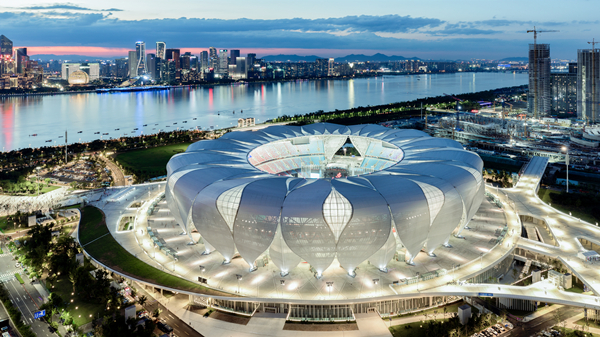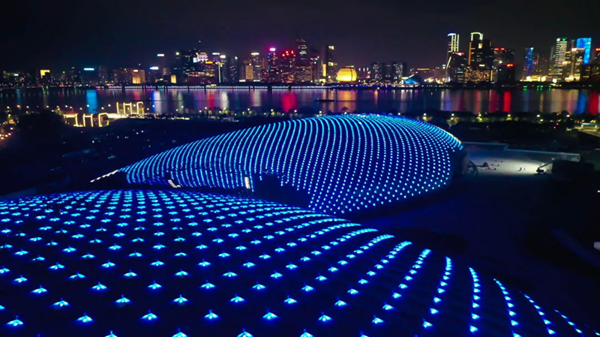Technology takes center stage in preparing smart and green Asian Games

The view of the main stadium for the Asian Games Hangzhou 2022. FANG JIANFEI/FOR CHINA DAILY
Cutting-edge methods employed in design and construction of Hangzhou venues
The 19th Asian Games Hangzhou 2022 will be held from Sept 10 to 25,2022 in Hangzhou, capital of East China's Zhejiang province. China Daily is teaming up with the organizing committee of the Games to spotlight the preparation for and facts about the Hangzhou Asian Games.
The Hangzhou OIEC Gymnasium and Hangzhou OIEC Aquatics Centre, a butterfly-shaped building located in the Hangzhou Olympic and International Expo Centre, looked like a glistening galaxy when its lighting system was tested recently.
In terms of technological presentation, the floodlighting achieved the concepts of "Green" and "Smart", two of the central threads running through the event's organization.
LED point lights were placed in holes of the double-layer roof of the gymnasium and aquatics center to form the transmittance effect. Meanwhile, high-power projection lights were used for color rendering on the contours of the building's exterior, which allowed four lighting modes, ordinary, festival, competition and energy saving.
The total power of the night-view lighting system of the gymnasium and aquatics center can reach about 417 kilowatts. It consists of 12,000 LED point light sources, 212 sets of high-power LED projection lights, more than 8,000 LED line lights, buried lights and 127 sets of smart lamp poles.
The smart lamp poles integrate lighting, monitoring and security, a 5G system, smart transportation, mobile phone charging, environmental sensing and information release. They are expected to bring a better experience to athletes, spectators and tourists, and to demonstrate the concept of "Smart Asian Games".
Building Information Modeling technology was required throughout venue construction of Hangzhou 2022, from design and construction to operation.
In terms of construction, BIM technology can transform two-dimensional drawings into three-dimensional models, so as to better discover the design defects of drawings, said Wang Wei, project manager of China Construction Eighth Engineering Division, a participant in the construction of the gymnasium and aquatics center.
By using its simulations, BIM technology can more intuitively and accurately grasp the layout of site construction, improve the utilization rate of the construction site and save land, Wang added.
From the perspective of venue application and operation, Gongshu Canal Asian Games Park Stadium, which covers a total area of 46.73 hectares, is being built for table tennis and hockey competitions.
It showcases various smart features, including LED screens, event lighting, venue amplification, flag raising, standard clocks, sports floors and seats.
Covered by a 5G network, the park stadium is expected to become an entire smart park system.
The stadium will introduce driverless L4 shuttle buses with up to six to eight stops, covering the park stadium's main venues and landscape areas, according to Liu Mi, general manager of Blue Town Hangzhou Asian Games Culture& Sports Development, which will be engaged in the stadium's operation.
Externally, the shuttle buses will be equipped with HD cameras, laser radar, millimeter wave radar and an ultrasonic radar and positioning system to ensure safety.
Internally, the buses' comfort can be adjusted through atmospheric lighting, a high-fidelity surround-sound stereo system, a passenger emotion monitoring system, wireless charging, in-car fragrance and an air nano-circulation disinfection system.
Furthermore, the park stadium will be equipped with a logistics transport level unmanned aerial vehicle for the immediate transport of items such as medical first aids, flowers, pets and fresh and frozen food. To date, the Hangzhou Asian Games Organising Committee has unveiled 30 intelligent solutions in 10 key areas for Hangzhou 2022, which is required to be green, smart and economical.
These solutions, selected from 187 proposals submitted by high-tech enterprises, universities and research institutions nationwide, will be applied to making the Games smart in a variety of operational areas.
Cutting-edge technologies including big data, artificial intelligence and virtual reality will be used to improve the operational efficiency of the Games and provide athletes, spectators and tourists with top-notch services.
Chen Weiqiang, deputy secretary-general of the Games' organizing committee and vice-mayor of Hangzhou, added: "Hangzhou will take advantage of its flourishing digital economy and mobilize social resources to make innovative technologies part of the preparation and hosting of the Asian Games."
"'Smart Games' will be a calling card for Hangzhou 2022. We are committed to staging a sport and cultural extravaganza that is successful, excellent, satisfying and unforgettable."
Venue construction in Hangzhou and in Zhejiang's co-host cities of Ningbo, Wenzhou, Jinhua, Shaoxing and Huzhou is in full swing.
A total of 58 facilities will be built in the province.
This is composed of 53 competition venues and five Asian Games villages and satellite villages. Of these, 42 are located inside Hangzhou and 16 outside.
Some 81 percent of the total investment of the 42 competition venues has been completed by the end of October. Construction has begun on eight of the remaining 11 venues, with the last three due to begin this year. By the end of this year, all the competition venues will be under construction, according to the organizing committee.
Forty-five of the first batch of newly-built and renovated venues are scheduled to be completed by March 2021. The remaining eight will be finished by October 2021. The Asian Games' villages and satellite villages will be completed and put into operation by the end of 2021.
"In order to hold an 'Economical Asian Games', among the 58 facilities, only 12 venues are newly-built, while 46 are renovated venues," said Qiu Peihuang, head of the venues department of the HAGOC. He added that they hope that holding the Games will improve the city's infrastructure.
The organizing committee will pay attention to the choice of building materials in a bid to make sure the competition venues can be used for a long time after the Games, said Qiu.
In addition, the venues of Hangzhou 2022 will use environmentally friendly electricity and reduce carbon dioxide emissions by about 15,200 metric tons.
The State Grid Corporation of China will empower all of the 58 Asian Games venues with advanced energy supply systems. These will guarantee more than 50 million kWh of environmentally friendly electricity.

The Hangzhou OIEC Gymnasium and Hangzhou OIEC Aquatics Centre applies high-power projection lights that are used for color rendering on the contours of the building's exterior. CHINA DAILY

 Print
Print Mail
Mail
 20 Cultural Symbols
20 Cultural Symbols Why Zhejiang
Why Zhejiang Experiencing high-tech products at WIC
Experiencing high-tech products at WIC Zhejiang Release
Zhejiang Release Zhejiang News
Zhejiang News